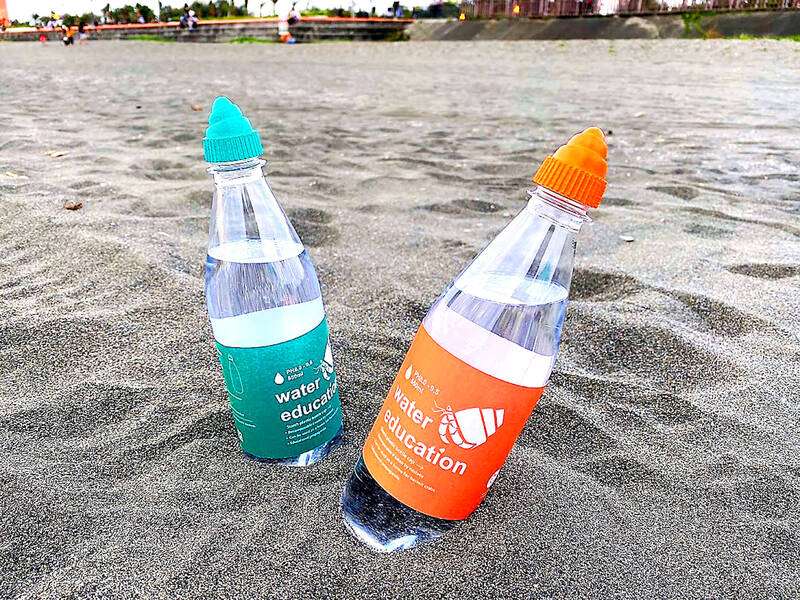A Taiwanese-designed biodegradable bottle cap that hermit crabs can use as their homes won gold at this year’s World Innovation and Invention Competition in South Korea, as Taiwan ranked first overall, according to the results, which were announced yesterday.
The competition attracted 243 entries from 12 countries, including Taiwan, which submitted 51 inventions, as well as Canada, Indonesia, Malaysia, the Philippines, South Korea, Thailand and Turkey.
Chen Chien-chih (陳建志), a lecturer at National Kaohsiung University of Science and Technology’s Center for Innovation and Entrepreneurship Education, led Tseng Yung-ting (曾詠婷), Lee Pin-an (李品諳), Wang Tzu-yuan (王子轅) and Ke Yung-cheng (柯永誠), a team of students from different backgrounds, in creating the biodegradable cap.

Photo courtesy of the Chinese Innovation and Invention Society
Made of plastarch material — a biodegradable thermoplastic resin that is derived from corn starch — the cap can serve as a home for hermit crabs before it decomposes.
Many hermit crabs are forced to use bottle caps as homes, as people remove the seashells the crustaceans typically use from beaches, Chen said, adding that they can die without suitable shells to live in.
The team designed a waterproof layer in the cap made with edible wax, which would not harm sea birds if ingested by accident.
Chen said he hopes the caps raise awareness about conservation.
The team has already obtained a patent for the cap.
Another gold-winning invention was a method for recycling lithium-ion batteries used in electric vehicles, conceived by Da-Yeh University environmental engineering professor Lee Ching-hwa (李清華) and graduate students Huang Yu-jui (黃于睿) and Shih Chen-hsuan (施辰宣).
The team used hydrometallurgical techniques to recycle valuable metals such as lithium, aluminum, cobalt, nickel, manganese and copper from the batteries of scrapped vehicles to promote a circular economy and curb environmental pollution, they said.
They have filed a patent for the project, which has been awarded a grant from the National Science and Technology Council.
Other gold-winning inventions included an interactive picture book created by a team led by Yen Ying-hung (閆嬰紅) at Asia Eastern University of Science and Technology; a smart pressure testing system for table tennis players devised by Tsai Meng-hsiun (蔡孟勳) and his students at National Chung Hsing University; and a fast decanter invented by Liu Wei-wu (劉緯武) and his students at Hungkuo Delin University of Technology.

US climber Alex Honnold is to attempt to scale Taipei 101 without a rope and harness in a live Netflix special on Jan. 24, the streaming platform announced on Wednesday. Accounting for the time difference, the two-hour broadcast of Honnold’s climb, called Skyscraper Live, is to air on Jan. 23 in the US, Netflix said in a statement. Honnold, 40, was the first person ever to free solo climb the 900m El Capitan rock formation in Yosemite National Park — a feat that was recorded and later made into the 2018 documentary film Free Solo. Netflix previewed Skyscraper Live in October, after videos

NUMBERS IMBALANCE: More than 4 million Taiwanese have visited China this year, while only about half a million Chinese have visited here Beijing has yet to respond to Taiwan’s requests for negotiation over matters related to the recovery of cross-strait tourism, the Tourism Administration said yesterday. Taiwan’s tourism authority issued the statement after Chinese-language daily the China Times reported yesterday that the government’s policy of banning group tours to China does not stop Taiwanese from visiting the country. As of October, more than 4.2 million had traveled to China this year, exceeding last year. Beijing estimated the number of Taiwanese tourists in China could reach 4.5 million this year. By contrast, only 500,000 Chinese tourists are expected in Taiwan, the report said. The report

Temperatures are forecast to drop steadily as a continental cold air mass moves across Taiwan, with some areas also likely to see heavy rainfall, the Central Weather Administration (CWA) said. From today through early tomorrow, a cold air mass would keep temperatures low across central and northern Taiwan, and the eastern half of Taiwan proper, with isolated brief showers forecast along Keelung’s north coast, Taipei and New Taipei City’s mountainous areas and eastern Taiwan, it said. Lows of 11°C to 15°C are forecast in central and northern Taiwan, Yilan County, and the outlying Kinmen and Lienchiang (Matsu) counties, and 14°C to 17°C

STEERING FAILURE: The first boat of its class is experiencing teething issues as it readies for acceptance by the navy, according to a recent story about rudder failure The Hai Kun (海鯤), the nation’s first locally built submarine, allegedly suffered a total failure of stern hydraulic systems during the second round of sea acceptance trials on June 26, and sailors were forced to manually operate the X-rudder to turn the submarine and return to port, news Web site Mirror Daily reported yesterday. The report said that tugboats following the Hai Kun assisted the submarine in avoiding collisions with other ships due to the X-rudder malfunctioning. At the time of the report, the submarine had completed its trials and was scheduled to begin diving and surfacing tests in shallow areas. The X-rudder,